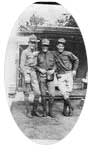 Armistice Day Is Long Forgotten
Armistice Day Is Long Forgotten
by Audrey Y. Scharmen
My outdated dictionary states that Armistice Day was to commemorate the anniversary of the cessation of hostilities of World War I. Such a quaint phrase. Equally quaint is the fable that The Great War ever was “the war to end all wars.” But that is what was taught to us in elementary school. That is why we celebrated that date each year, said the teachers. We believed them — with reservations. Actually it sounded just too pat to me, even at my tender age.
That November date is still on the calendar, but it has never become important enough to have its own three-day-weekend. In 1954, it was quietly changed to Veterans Day and, along with the veterans, eventually was relegated to the past and mostly forgotten.
At an early age, I began to question the wisdom of grownups. My intuition surfaced when our teacher talked of wars of the past. Lots of wars. One of the first pieces she read that impressed me was Robert Southey’s poem “After Blenheim.” It was a gripping story of a battle fought in a Bavarian village beside the Danube in 1704. Old Karl’s grandchildren are gathered about the doorstep of his cottage in the midst of the battleground where thousands had perished so long before. He is explaining the presence of a human skull found by the children in the freshly tilled soil of a garden nearby. His is the story of his father, a survivor of the war.
When Karl’s horrific tale is concluded, he jubilantly remarks: “Great praise the Duke of Marlbro won, and our good Prince Eugene!” Little Wilhelmine declares that the war was “a very wicked thing.” Old Karl replies: “Nay. It was a famous victory.” Young Peterkin then asks: “But what good came of it at last? The old man repeats stubbornly: “Why — I cannot tell. But ‘twas a famous victory.”
I can imagine Old Karl telling them not to worry, to just bury the skull, run off and play.
We kids were to hear many unsatisfactory answers to our questions along the way to war. We read of the failure of The League of Nations, which was formed by grownups as a kind of council-fire where representatives of all nations would come to negotiate and mediate, then demonstrate. If we had been around when it was conceived in 1920, we could have told them it would never work.
Grownups have abandoned all logic and common sense and realism in their dealings with one another. Those in charge of war refuse to reckon with human nature. Reason is replaced by greed and a great lust for power.
Now we see the gradual demise of the U.N. as another example of failure. In the 1930s, when we were learning our first lessons about war, a pompous, posturing little despot far across the sea was planning his version of war to end all war, and my generation would receive a special invitation to participate — along with Wilhelmine and Peterkin. The rest is history. The past is prologue.
And still the grownups are telling us kids not to worry. Just shut up and run and play.
On my desk is a faded sepia photo of my dad in the khaki uniform of The Great War. He was prepared to go, but he wasn’t called up. But his offspring have been going to wars regularly ever since. He is smiling from the snapshot, tall and handsome and very grand in puttees and a jaunty broad-brimmed hat. He is the image of his great grandsons. So young. Just right for war.